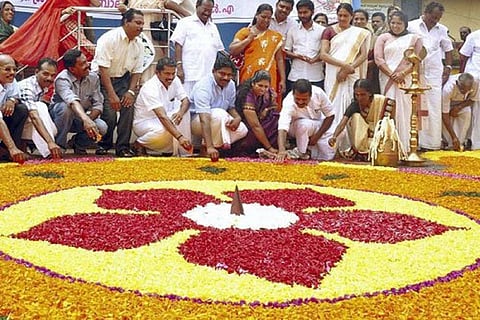Jasmine, marigold, oleander: Kerala is growing its own flowers for Onam
Self-sustainability in vegetable and flower cultivation for the Onam season has always been a dream for Kerala. Flowers come from Gundlupet, Thovai, Trichy, Sundarapandiapuram, Dindigul and other places in neighbouring states. Earlier, flowers for pookalam (intricate arrangement of flowers made on the floor during Onam festival) were collected from the neighbourhood. People would use thumbapoo, chembarathi, krishnakireedam, chethipoo, kolambi and many other locally found flowers. But over time, the size and trend of pookalams has changed, with people buying flowers from the market.
As per reports, around 400 tonnes of flowers – brought to Kerala from neighbouring states – are sold during the 10 days of the festival. In 2020, considering the COVID-19 situation, Chief Minister Pinarayi Vijayan had initially barred flowers from other states, but the move kicked up a huge controversy. After florists protested against the order, it was revoked. However, this time around there have been serious efforts from the government to cultivate flowers locally for Onam.
The Left Democratic Front government has included the ‘Poovili 2022’ project in its prestigious 100 days programme (different projects that have to be completed in 100 days). Poovili encourages floriculture, especially during Onam. Agriculture officers at the district level have been directed to provide all necessary support for the project. Through this, the government hopes to be fully self-sufficient in flower cultivation within five years.
Many local self governments (LSGs) across the state took up the project and have successfully started growing flowers such as marigold, chrysanthemum, jasmine and oleander, which are popularly used for pookalam. LSG authorities, agriculture officers, farmers and Kudumbasree workers said they are thrilled at the amazing results they are seeing from the project.
In Thiruvananthapuram district, the flowers are cultivated in 8.51 acres in six gram panchayats and two block panchayats in Nemom and Vellanad. In most panchayats, Kudumbasree helps in the cultivation process. In Kattakada and Parassala panchayats, the authorities said that the yield was beyond their expectation. In Parassala, where flowers were planted on 80 cents of land, the first yield was in May and the next yield is now ready for Onam.
“The cultivation we started in March has yielded more than 750 kg of flowers until June, from which we got a profit of Rs 40,000. We expect another yield of 200 kg for Onam,” Parassala panchayat president SK Ben Darvin said. He added that the panchayat will continue floriculture throughout the year and not limit it just for the Onam season.
The prices of many of the flowers triple or increase by even five times during the Onam season. Marigold usually costs Rs 60 per kg, but during Onam the price can go upto Rs 200 to Rs 250. “Jasmine is one of the costliest flowers during Onam. In the month of May, it costs Rs 100 to 150 per kg, but during Onam it goes up to Rs 1,000 or Rs 1,300 per kg,” says Mari, a flower seller from Thiruvananthapuram.
In some places in Thiruvananthapuram, a few farmers cultivated the flowers under the Pradhan Mantri Krishi Sinchayee Yojana (PMKSY)-Watershed Component in convergence with the Mahatma Gandhi National Rural Employment Guarantee Scheme (MGNREGS).
Not just in Thiruvananthapuram, floriculture has been a huge success in many other districts too. Cultivation was started in Ernakulam district’s Cheranalloor gram panchayat and Edapally panchayat in the second week of June, under the leadership of the Cheranelloor Krishi Bhavan. This time the Krishi Bhavan provided saplings to farmers who were ready to cultivate flowers under the scheme. LSG authorities said that many people are visiting to witness the flower cultivation in different districts.
Over the last few years, the Kerala government has also been conducting the ‘Oru Muram Pachakari’ (a basket of vegetables) challenge, to encourage people to produce organic vegetables needed for Onam in their own kitchen yards. The challenge was taken up by government offices, public schools, LSG offices and police stations, and many other public spaces were utilised for vegetable cultivation as part of this project.

